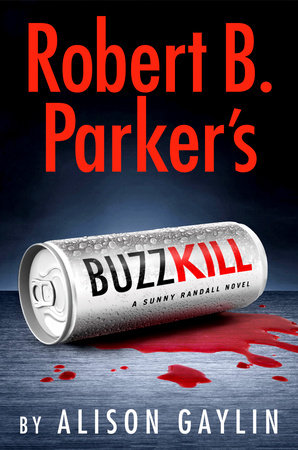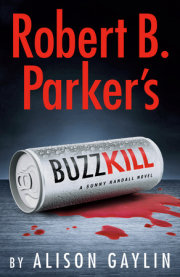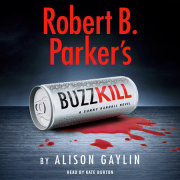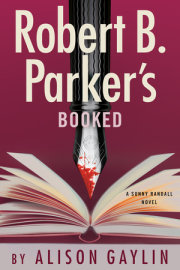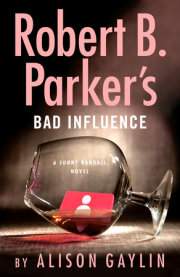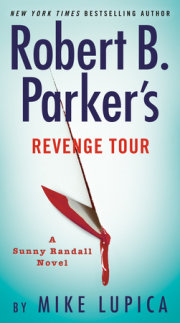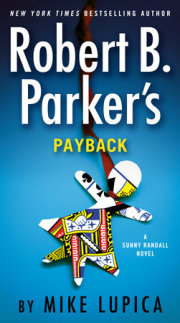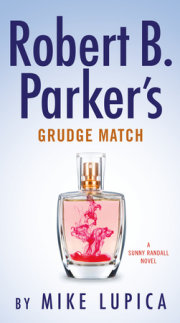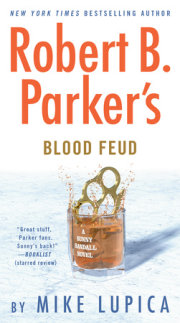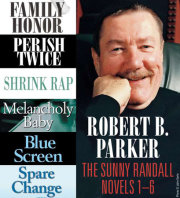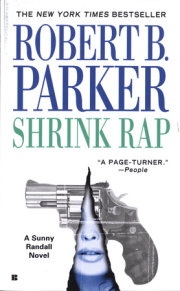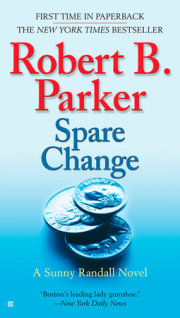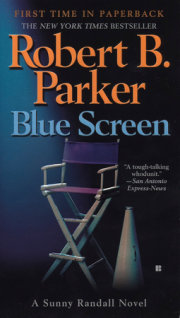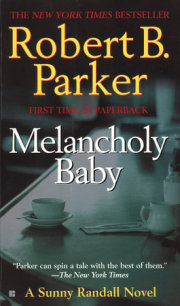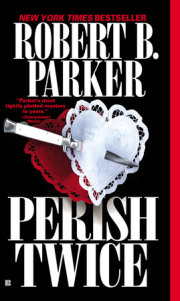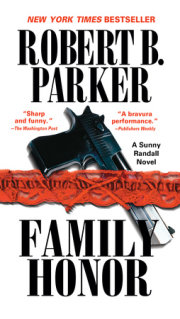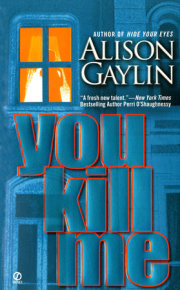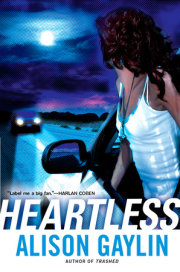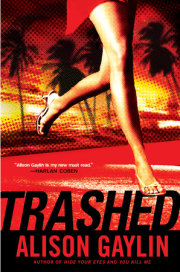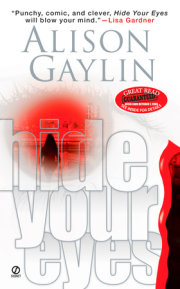One
I never thought I'd say this," I told Richie, "but I love New Jersey."
Richie grinned. "All you've seen of it is my apartment."
He was correct, if a little generous. I'd seen the kitchen, because my dog, Rosie, had insisted. And then the bedroom, which was where we currently were, lying on our backs in the pink glow of a glorious December sunset, having just caught our breath. The ocean view from the bedroom window was spectacular, and the bed itself was heaven, the sheets a fine Egyptian cotton and with a ridiculously high thread count, bought by Richie especially for this occasion, "because I know you like that fancy stuff." But if I was going to be honest, the rest of Richie's apartment was a blur. "I've seen and experienced the best that the Garden State has to offer," I said.
"Can't dispute that," Richie said.
Rosie nosed open the bedroom door and scuttled in, her claws clacking on the parquet wood floor. She jumped up on the bed and burrowed between us until her big bull terrier head was under both of our pillows, her lower half sticking out, tail wagging. The perfect family portrait. I'd have snapped a selfie so I could paint it later, but I didn't want to ruin the mood.
"I've missed you, Sunny," Richie said.
I gave him sad eyes. "You've only missed me for my dog."
Rosie knew the word dog. On cue, she pulled her head out from the pillows and licked Richie's cheek. He smiled, scratching her behind the ear. "It is a pretty sweet package deal," he said.
It had been nearly five months since I'd been in the same room as my ex-husband. The last time he'd seen me in bed, it had been a hospital bed, and I'd been recovering from stab wounds after a run-in with a psychopath.
And so, for two people who had decided to try to make a go at . . . something . . . we had a lot of catching up to do. Physically speaking, we'd accomplished that mission, but that was no surprise. Nonverbal communication had always been our strong suit. The problem was talking. Figuring out what, exactly, this "something" was.
The one constant throughout our very long and complicated relationship was this: Richie was the one who wanted to put his foot on the gas, while I was content to keep the gearshift in park for as long as I possibly could. It had been the reason we'd divorced-and the reason he'd remarried, had a kid, and divorced again. And it had been the reason I'd gone into analysis.
But things change. People change. Even me. Once you hit a certain age, a long absence can affect you in ways you never expected it to.
"Rosie's missed you, too," I said.
Richie and I had been in touch via phone and the occasional Zoom chat since his big move down the shore (get me, talking like a Jersey girl). But our busy schedules had prevented us from seeing each other until now. On Richie's end, it was starting a new job as general manager of Candy's Room-a bar/restaurant that advertised itself as being "the number-one destination for the world's greatest Springsteen tribute bands"- as well as working out a joint custody schedule for his son, Richard Jr., in a whole new state.
For me, it was the fame I'd acquired as the result of a high-profile case I'd solved-which involved a couple Instagram influencers, as well as the aforementioned run-in with said psychopath. With the Boston press swarming my apartment building and calling me nonstop following my release from the hospital, I'd finally relented, giving an exclusive interview to Tom Gorman, a sweet Globe columnist I'd dated for about a minute the previous year. No sparks. (I'd left my heart, as it seemed, in New Jersey.) But professionally speaking, the interview had changed my life. It went viral, landing me with more work than I knew what to do with. Other than Thanksgiving, this was my first free weekend since July. So at long last, I'd packed a bag, grabbed Rosie, and taken the four-and-a-half-hour drive to Richie's apartment.
So far, the reunion had been better than I'd dreamed it would be. And I have excellent dreams. Ask my shrink. She's blushed more than once-and believe me, she's not a blusher.
I rolled over onto my side and ran a hand through Richie's dark hair, inhaling his clean, familiar scent. Rosie licked my hand and flipped onto her back so I could rub her belly. I could be happy here, I thought. Maybe.
"You ever miss Boston?" I said.
"Yes and no."
"Meaning . . ."
"I don't miss owning the saloon. I don't miss the traffic. I don't miss all the baggage that comes with people knowing who my dad is. But I do miss my dad. I miss the regulars at the saloon. I miss being able to get a decent lobster roll. I miss the lights on the harbor at sunset. I also miss the Bloody Marys at the Russell House and . . . you know . . ."
"Spike?"
"Sure," he said and smiled. "I miss Spike."
I smiled back. "And Rosie."
"We already covered that." Richie kissed my hand. Rosie snuggled between us, and I felt hopeful and confused and nervous and content, all those conflicting emotions rushing back, the way they always did when I was with Richie after a long absence or even a short one. And I could tell he was feeling the same. It seems like you understand each other, my shrink, Susan Silverman, had told me during my last visit.
We do, I'd replied. We always have. But does that mean we belong together?
That's a question only you can answer, she had said, which hardly seemed fair, considering how much time and money I'd invested in her over the years.
I asked Richie how his son was enjoying his new school. He said he loved it. I asked him about work, and he said he couldn't complain. He asked me about my work, and I told him that I couldn't complain, either. Then I let him know that I'd turned down multiple offers from Bill Welch, a multimillionaire who wanted me to "discreetly" track down his wayward son, Dylan-the CEO of an energy drink company called Gonzo and, as a side note, a total douchebag. (I'd dealt with Dylan back in July, and in my humble opinion, he was better off missing.)
"How much did Welch offer you to find his son?" Richie asked.
"Not enough to cancel my weekend plans."
Richie looked at me in a way that could have melted the polar ice caps. "As your weekend plans, I'd like to show my appreciation."
We kissed. We kissed some more. Things progressed. And then, when we were catching our breath for the second time, Richie asked the million-dollar question.
"Sunny," he said. "Where do we go from here?"
I gazed deep into his eyes and gave him a blinding cop-out of a smile. "How about out to dinner?"
"I was thinking the same thing," Richie said. He looked relieved. Or maybe I was just projecting. Another question for my therapist, I supposed.
After we were dressed and outside and he’d locked the door behind us, Richie slipped his arm around my waist. “You know what?” he said.
"What?"
"I wouldn't mind having you nearby for more than just a weekend."
"You say that now, but I only just got here."
"I know."
"You could be really annoyed with me in forty-eight hours."
"I'm willing to take that risk."
I rested my head on his shoulder, the palm of my hand against the back of his coat. It felt terrifyingly comfortable. "I'll think about it," I said.
Richie kissed my forehead. He pulled me closer. "That's good enough for me."
Two
I spent an extra day down the shore. It meant I had to leave on Monday before dawn to get home, shower, change, and go back to my office at a reasonable hour, but it was worth it. I loved Asbury Park in December-the windswept beach, the absolute quietness of it, the Christmas tree Richie and I passed every day during our long walks by the water-a scraggly pine bedecked with painted seashells. I loved the cold, the way it made us huddle together, and the fact that the Jersey Shore's population thinned by more than half during the offseason, making it possible to get a table at any restaurant we wanted, no matter the time.
And the sunsets. Always, the sunsets.
By the time Rosie and I got back to my apartment, I was already deeply homesick for New Jersey. I listened to Springsteen on Spotify as I got ready for work-changing out of my comfy sweats and into a Brunello Cucinelli sweater dress-replaying scenes from the weekend in my mind. I thought about everything Richie and I had said to each other-and everything we didn't say. Beyond that brief exchange outside his apartment, we'd never gotten around to answering the dreaded "Where do we go from here?" question. But maybe that was for the best. When it came to relationships, I'd never done well with road maps. It was better to take things one day at a time. And on this particular day, at this particular time, anything felt possible-even moving away from Boston.
Once I was dressed and Rosie was fed, I stretched a canvas. After work, I planned to paint the view from Richie's bedroom.
"What do you think, Rosie?" I said as I eyed the blank white cloth. "Winters on the Jersey Shore? Summers? The whole year?"
Rosie barked.
"You're right," I said. "It might be difficult to move in with Richie right away with his son there every other week. I mean . . . Richard Junior is great, but am I ready to be a stepmom?"
Rosie barked again.
"Find a place of my own down there? That could be very expensive, Rosie. Especially if I want to keep this loft."
She followed me into the kitchen. I tossed her a treat and thanked her for listening.
My phone dinged. It was a reminder that, at five p.m., I had an appointment with Susan Silverman. It couldn't have come at a better time.
When I arrived at work at ten a.m., my new-ish receptionist, Blake James, was sitting at his desk, taking a selfie. Once an influencer with hundreds of thousands of followers, Blake had deleted his Instagram account four months ago following a family tragedy. But in his case, apparently, old habits died hard.
"Morning, Blake," I said as I walked in.
"Morning," he said. "I was just trying to get a look at this . . . this wound."
"What wound?"
"This one." He pointed to his jaw. "I cut myself shaving this morning. I think it might be infected."
"I don't see anything."
"You sure?"
I moved closer. From this distance, I could make out a tiny scratch in Blake's otherwise flawless skin. "It doesn't look infected," I said. "Does it hurt?"
"No."
"Then it's probably not."
Blake's face relaxed. I was used to this. Blake was a very young twenty-two. He'd grown up mostly without a mother and had been through a lot of trauma within the past year. And so, as muscular and self-assured as he appeared on the surface, he was continuously showing me his ouchies. "Thank you, Sunny," he said.
"Don't mention it."
He put down his phone. "How was your weekend?"
"Fantastic."
"Did Rosie have fun?"
"She did."
"I wish you'd brought her in. I miss her."
"She was pretty tired this morning," I said. "But I'll bring her in tomorrow."
"Cool," Blake said. He loved Rosie. I appreciated that. I also understood his need for a job, and, following the uptick in business, my need for a receptionist. But still, it was hard getting used to anyone in my office every day-especially on those mornings when I wasn't in the mood to talk. Blake was always in the mood to talk. Always.
"I made coffee," Blake said. "It's really good. I saw this TikTok where a girl put a teaspoon of nutmeg and a teaspoon of cinnamon in with the grounds. She said it makes the coffee less bitter, so I tried that and it worked. You want some?"
"Maybe later," I said. "Thanks." I started toward my office.
"Oh, I almost forgot," Blake said. "You have a customer . . . Sorry. Client," he said. "I'm still learning this private investigator lingo."
"Potential client? Because I haven't taken on anybody new."
"Right. Potential," he said. "Anyway, she's in your office."
"I don't remember scheduling any meetings."
"Yeah, it wasn't on the calendar. But she said it was urgent."
"Who is she?"
"Dylan's mom."
"Dylan Welch?"
"Yeah."
"I said no to his father."
"His mom said 'no' wasn't an acceptable answer."
I let out a long, draining sigh.
"Rich people," Blake said. "Am I right?"
"Why did you let her in?"
Blake's cheeks reddened. He picked at a nail. "You know how pushy Bill Welch was?"
"Yeah?"
"How he kept having his assistant call about his son over and over again after you said no and recommended other PIs, and how he sent you all those emails telling you that the names you sent were unacceptable, and we were both like, 'What the hell is his problem?' Remember all that?"
"I remember, Blake," I said. "It was a week ago."
"Well, his wife, Mrs. Welch. Lydia."
"Yeah?"
"She's worse."
On cue, the door to my office opened. A tall blond woman stepped out, sporting head-to-toe Chanel, a fresh blowout, huge but tasteful diamond stud earrings, and a look on her face like she wanted to speak to the manager-and rip her limb from limb if she didn't get her way.
Blake shuddered, noticeably.
"Lydia Welch?" I said to the woman.
"Sunny Randall," she said. "We need to talk."
Three
Before today, I'd seen Lydia Welch only once, and that wasn't even in person. I'd seen her in a family photo that she'd shared on Facebook five years ago, taken at the Welch summer home in Nantucket on the Fourth of July.
Surrounded by her loved ones, Lydia had struck me as laid back, relaxed, and very down-to-earth, especially for someone in her tax bracket. It just goes to show how misleading social media can be. Granted, she was on vacation in the picture-and clearly in a much better mood. But the Lydia Welch I encountered in my office could have easily pulled a set of quietly elegant brass knuckles out of her Birkin bag and knocked Facebook Lydia senseless.
I asked Blake to bring us two cups of his coffee, and he practically sprinted out of the room.
Copyright © 2024 by Alison Gaylin. All rights reserved. No part of this excerpt may be reproduced or reprinted without permission in writing from the publisher.

